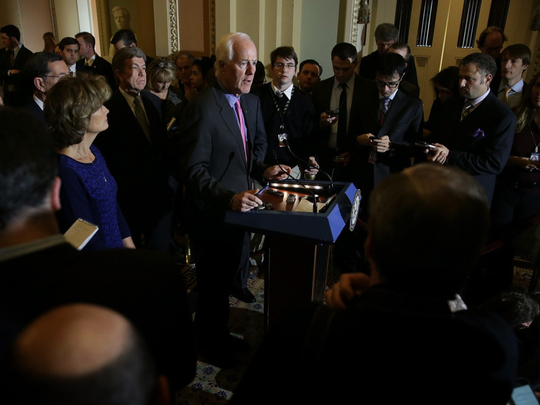
The political chattering classes, who love a good story, are obsessed with the battle for the establishment choice for the 2016 Republican presidential nomination: Jeb Bush, Mitt Romney or throw in a little Chris Christie.
Bush and Romney are marquee names in US politics and the Republicans have not nominated an anti-establishment candidate since Barry Goldwater more than a half century ago.
Yet, there is an equally interesting, and perhaps as important, struggle for the movement-conservative or non-establishment crown. There is a sizable segment of Republican voters who believe it is time to break that 50-year run.
This time, these candidates are a remarkably diverse group whose central commonality is that they are not the favourites of the Republican political establishment or Wall Street and other major business backers of the party.
They include Rand Paul, a limited government libertarian; the social conservatives Mike Huckabee and Rick Santorum; Senator Ted Cruz, the combative and most forceful foe of immigration reform; a national security neoconservative, Senator Marco Rubio; governors in and out of office; as well as the latest darling of the tea party crowd, Ben Carson, a paediatric neurosurgeon who has never run for office.
The political Right believes its prospects of winning are enhanced by this diverse field, which seems more formidable than in the past, when it contained aspirants such as Herman Cain, a pizza executive, magazine publisher Steve Forbes and ex-House speaker Newt Gingrich.
“The movement conservative field is much stronger this time,” says Steve Scheffler, president of the Iowa Faith and Freedom Coalition.
With a wide-open race, unpredictable patterns may emerge. But since 1976, no candidate has made it to the nomination without winning one of the two initial tests in Iowa and New Hampshire (when there were contests in those states). That suggests New Hampshire will be a pivotal showdown for Romney and Bush — and possibly Christie — if they run.
For the non-establishment side, the crucible will be Iowa, where social conservatives have been a dominant force in the caucuses; Santorum and Huckabee won the last two.
The Iowa contest is more than a year away. For the moment, Paul probably is the best-organised and he inherits much of the support from his father, Ron Paul, who finished a strong third in Iowa in 2012. It is widely agreed that the younger Paul is a much better candidate. Cruz and Rubio have little presence as of now. There is a lot of buzz about Carson in both focus groups and polls.
Chuck Hurley, a conservative activist in Iowa who plans on “staying neutral for the next 10 months,” says he will consider a wide range of items, from immigration to hot-button social issues such as abortion and “freedom of conscience” questions.
Foreign affairs and reducing the national debt also are high on the agenda, as Hurley looks for a candidate with passion for “nonsocialistic answers and a compelling vision to restore limited government”.
As almost every conservative contender would fit the bill, the question is which one would be most persuasive.
There could be other determinants in this race. Midwestern governors including Scott Walker of Wisconsin, Ohio’s John Kasich or Indiana’s Mike Pence may see an opening for a non-Washington fresh face with governing experience. Walker did surprisingly well at a conservative conference in Iowa last week, as did Cruz, though that was expected.
The Bush-versus-Romney battle already has generated more attention than comparable early match-ups of the past, including Hillary Clinton and Barack Obama eight years ago at this time. Then, the conventional wisdom was that an upstart could never topple a Clinton — the establishment.
That is instructive to keep in mind as the battle for the hearts and minds, and especially votes, of the Right intensifies over the next few months.
— Washington Post
Albert R. Hunt is a Bloomberg columnist.









